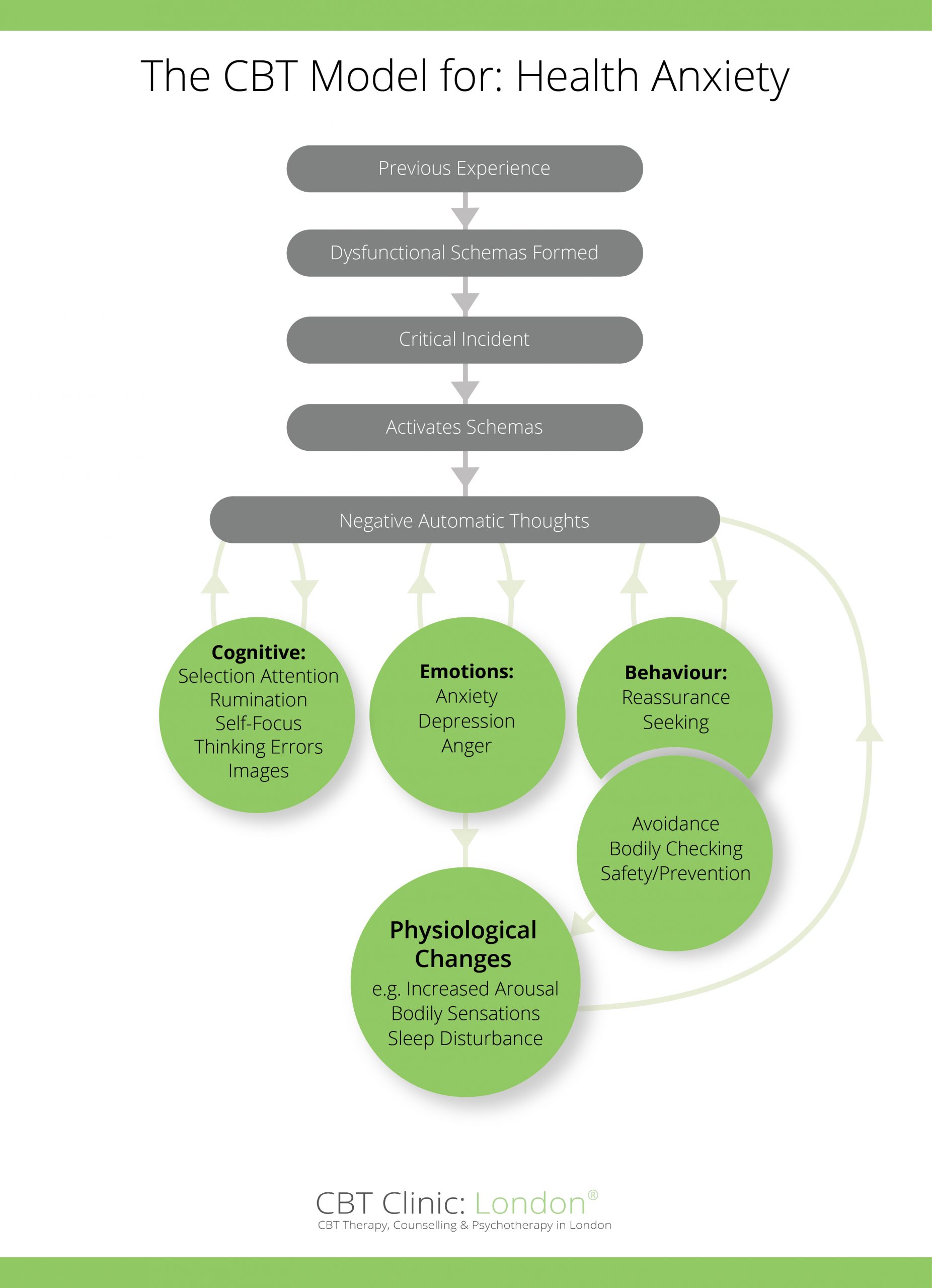CBT Therapy : Health Anxiety
Effective Treatment For: Anxiety
HEALTH ANXIETY:
Health anxiety (sometimes called hypochondrias) is when you spend so much time worrying you’re ill, or about getting ill, that it starts to take over your life.
Check if you have health anxiety
You may have health anxiety if you:
- constantly worry about your health
- frequently check your body for signs of illness, such as lumps, tingling or pain
- are always asking people for reassurance that you’re not ill
- worry that your doctor or medical tests may have missed something
- obsessively look at health information on the internet or in the media
- avoid anything to do with serious illness, such as medical TV programmes
- act as if you were ill (for example, avoiding physical activities)
Anxiety itself can cause symptoms like headaches or a racing heartbeat, and you may mistake these for signs of illness.
Are you suffering from Anxiety? Take our Online Anxiety Assessment and make the first step towards recovery.
Patient Quote
“Before I had CBT Therapy I was so anxious as I just couldn’t stop worrying about my children. It was causing problems for me and them. I was texting them all the time to see if they were safe. Thanks to the CBT Therapy I learned to manage my worry and worry less. Things are so much better now for me and my kids. I’m so much less anxious and my children are free again to live their lives.”
Sue, IT Manager
2: Do I have GAD?
- Symptoms
Symptoms – Generalised anxiety disorder in adults
Generalised anxiety disorder (GAD) can affect you both physically and mentally.
How severe the symptoms are varies from person to person. Some people have only a few symptoms, while others have many more.
Psychological symptoms of GAD
GAD can cause a change in your behaviour and the way you think and feel about things, resulting in symptoms such as:
- restlessness
- a sense of dread or fear
- feeling constantly “on edge”
- difficulty concentrating
- irritability
Your symptoms may cause you to withdraw from social contact (seeing your family and friends) to avoid feelings of worry and fear.
You may also find going to work difficult and stressful and may take time off sick. These actions can make you worry even more about yourself and increase your lack of self-esteem.
Physical symptoms of GAD
GAD can also have a number of physical symptoms, including:
- dizziness
- tiredness
- a noticeably strong, fast or irregular heartbeat (palpitations)
- muscle aches and tension
- trembling or shaking
- dry mouth
- excessive sweating
- shortness of breath
- stomach ache
- feeling sick
- headache
- pins and needles
- difficulty falling or staying asleep (insomnia)
Citation: NHS Website
GAD does not have a single cause. Your genes, social environment and life experiences all play a role, and interact with each other. If you have a close family member with GAD, you are four to six times more likely to develop an anxiety disorder. However, no single gene causes anxiety disorders. Instead, multiple genes, each having a small effect, interact to increase your risk.
Psychological treatments for Generalised Anxiety Disorder (GAD):
Both Cognitive Behavioural Therapy (sometimes shortened to CBT Therapy) and Applied Relaxation involve weekly meetings with a CBT Therapist for about 3 to 4 months.
CBT Therapy helps you to understand how your problems, thoughts, feelings and behaviour affect each other. It can also help you to question your negative and anxious thoughts and do things you would usually avoid because they make you anxious.
Applied Relaxation involves learning how to use muscle relaxation techniques when you are feeling anxious or in situations that could make you feel anxious. Your healthcare professional will help you to gradually encounter and cope with these situations.
If you do not think that the course of CBT Therapy or applied relaxation has helped you, you should be offered medication.
Intolerance of Uncertainty
Positive Beliefs About Worry
Cognitive Avoidance
Generalised anxiety disorder F41.1
21. The essential feature is anxiety which is not restricted to any particular environment
or stressful event. The anxiety symptoms are often said to be “free-floating” in this
situation. There is pervasive worry with ideas such as fear of illness in the sufferer or
in members of their family. In addition there are feelings of nervousness and
apprehension with physical symptoms such as light-headedness, muscular tension,
inability to relax, palpitations, dizziness and sweating.
22. The diagnostic criteria in ICD-10 in brief are:
22.1. That there must be a period of at least 6 months in which there has been
prominent tension, worry and apprehension about everyday problems.
22.2. In addition there are at least four of the symptoms of anxiety listed in
paragraph 10.1-10.4 above.
22.3. In addition there is muscle tension, restlessness and inability to relax, feeling
“on edge” or tense, a sensation of a lump in the throat or difficulty
swallowing. There may also be an exaggerated response to being startled,
difficulty concentrating, persisting irritability and difficulty getting to sleep
because of worrying.
22.4. Similar symptoms can be caused by physical disorders such as
hyperthyroidism, the consumption of amphetamines or withdrawal from
benzodiazepines. To be diagnosed as generalised anxiety disorder none of
these physical disorders must be present.
22.5. The sufferer must have the symptoms on most days, for at least several
weeks at a time (and usually for several months).
23. The disorder also appears in DSM-IV. However at least six symptoms must be
present (as opposed to four in ICD-10). It has also been noted that the condition is
very difficult to diagnose, different diagnosticians varying greatly in their opinions as
the symptoms are very common in many other psychiatric disorders.
Book a Free Consultation with a CBT Therapist in London:
We have facilitated the successful recovery of many people who suffer from GAD.
If you would like help with Generalised Anxiety Disorder ( GAD ) then get in touch with us using the form below.
CBT Therapist London
This article was curated by Alistair Bond – Senior CBT Therapist in London. He is the Clinical Director of the CBT Clinic London and he specialises in treating Generalised anxiety Disorder (GAD) with CBT Therapy.
If you or a loved one are struggling with Generalised anxiety Disorder (GAD), please get in touch with us. You can call our friendly reception team on 0207 157 9924, email info@cbtcliniclondon.com or simply fill out our new patient registration form and we’ll get back to you.

Online or Face to Face CBT Therapy?
We offer CBT Therapy either Online or Face to Face in our London Clinic. We also offer the option to combine both to suit your lifestyle and preference.


